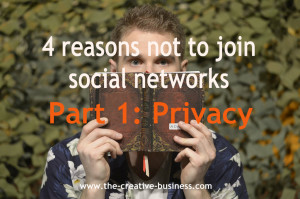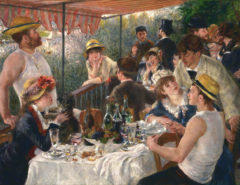To make this clear at the beginning: I love social networking. I still get excited by the idea of being able to contribute to this amazing worldwide newspaper to which we all have access online. For me it represents a tool that helps democracy in the best sense, connects people together with the same interests, can help provide education to many countries and could – if used correctly – raise the world’s knowledge through crowdsourcing quicker and more efficiently than was ever possible before. But there are also very good reasons to be extremely suspicious of social networks. And this is what I would like to discuss in this blog post.
Most people mention four reasons why they are afraid to join social networks:
Privacy
- I don’t want other people or Facebook, Twitter etc. to know so much about me.
- I don’t want advertisers to tailor their offers to my needs. And I don’t want everyone to know where I am and what I’m doing.
Copyright
- I’m afraid people can steal my ideas. Other people can much too easily copy my ideas, or even download my photos and claim them to be theirs.
Time
- I don’t have the time to be active on social platforms. I want to spend my time with ‘real’ friends and activities. I hate seeing groups of people together – each of them playing around with mobile phones.
Trivialism
- I’m afraid to loose my identity by getting too dependent on other people’s feedback. A ‘like’ is not real! I don’t necessarily want my art to be popular in this kind of platform. Popularity might trivialize the value of my art.
I want to go through each of these very serious concerns in detail.
Part 1: Privacy
The sad truth is: the moment you do anything online someone is probably tracking your activity. This can clearly be seen on certain commercial site: the moment you show interest in any book or product, the site kindly offers you similar products you might be interested in. It stores information by default and will surprise you with tailored offers when you log in the next time.
Many other websites, platforms, online shops use so called ‘cookies’ to ‘improve’ the users experiences on their sites and to help them to find exactly the right product what the innocent users didn’t even know they wanted.
You can prevent this to a certain extent by changing your settings to ‘private browsing’ each time you log into your browser and by ‘deleting all cookies’ after you have been active on those platforms mentioned above, where cookies are used by default. (Now – how about your settings on mobile devices? Does your navigation system use GPS?)
Even with all the best precautions, privacy online is more or less an illusion.
Social Media Platforms are no different except that newcomers are most of the time AWARE that they give away part of their privacy by joining the network.
Also on these platform you can change the settings to who will be able to see your updates, photos, friends etc. – but be warned – it is nearly impossible to control exactly who is going to get what information with the liking and sharing system of most networks.
Facebook puts it in words in the Terms and Policies:
‘Although you choose with whom you share, there may be ways for others to determine information about you (…) When you comment on or ‘like’ someone else’s story, or write on their timeline, that person gets to select the audience. For example, if a friend posts a public story and you comment on it, your comment will be Public.’
Facebook offers something called ‘Timeline visibility control’. You can hide certain things on your timeline like your gender, your friend list and date of birth. It seems a good idea but also has its limits.
‘Your friend list is always available to the games, applications and website you use, and your friendships may be visible elsewhere…’
‘When you hide things on your timeline, like posts or connections, it means those things will not appear on your timeline. But, remember, anyone in the audience of those posts or who can see a connection may still see it elsewhere, like on someone else’s timeline or in search results.’
Facebook also uses Cookies. So don’t think no one will know anything about you if you don’t ‘like’ anything, if you don’t comment anywhere and share no updates. Every movement of your cursor or mouse will be tracked by Facebook to ‘improve’ your overall experience and sell these data to advertisers. This much you have agreed on by signing into this platform.
Facebook Data Use Policy:
‘We receive data about you whenever you use or are running Facebook, such as when you look at another person’s timeline, send or receive a message (This is private messaging, right?), search for a friend or a Page, click on, view or otherwise interact with things, use a Facebook mobile app, or make purchases through Facebook.’
Also very interesting:
‘When you post things like photos of videos on Facebook, we may receive additional related data (or metadata), such as the time, date, and place you took the photo or video.’
YES – there is all reason to be concerned of your privacy when you are thinking of joining social networks. Privacy is NOT the purpose of social networking!
Any information you put in there will get spread without real control. If you don’t mind that or even use it to your advantage – Social Media is the right thing for you.
The rule is simple:
You don’t put anything on the web that you can’t shout on the marketplace for everyone to hear.
I suggest keeping a list of people visible next to your computer: people you are usually very careful to share information with like your employer, some of your neighbours maybe, your mother-in-law – and keep those in mind before you click the share button.
Are all these people allowed to know it? Ok – off you go!
There are no real secrets on the web – full stop! If you want to share something privately write a letter and send it by post.
Every ‘like’ you click, every photo you upload, every update you make will be seen by MANY people no matter what kind of settings you have chosen.
The only way to protect your privacy completely is to refrain from using either computer, GPS in your car, mobile phone or credit card: hardly possible today.
But if you decide you still want to use the Internet be AWARE of what you are doing. You are not private! And KNOW how much information you are really giving away with each post (did you remember to switch off geo-tagging in your phone’s settings before you took this photo you are about to share?).
Be careful of the content you are posting! Think also twice every time you want to ‘like’ something or comment.
Everything you do leaves a kind of fingerprint. And the Internet never forgets!
Why would you still want to join social networks and give away your privacy?
- Because you might have something to say.
- You want to reach as many people as possible.
- You want to educate.
- You want to share what makes you happy.
- You want to communicate.
- You want to contribute to a newspaper that can be read worldwide and is free.
- Or – as an artist – you are here to live out loud.
“I am here to live out loud.” (Emile Zola)
4 reasons not to join social networks – part 2: copyright
4 reasons not to join social networks – part 3: time
4 reasons not to join social networks – part 2: trivialism
photography: Peter Kainrath









Great post Andrea. Can’t wait to read the next one…
Keep rockin…
Best,
Roger
Thank you very much, Roger!